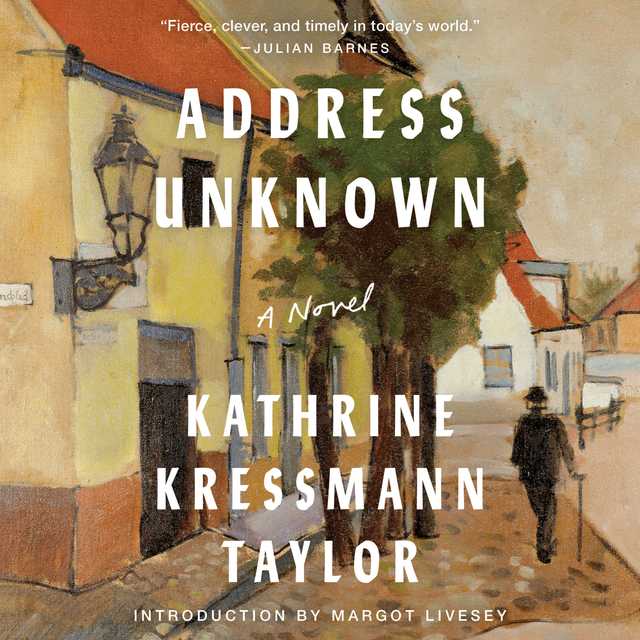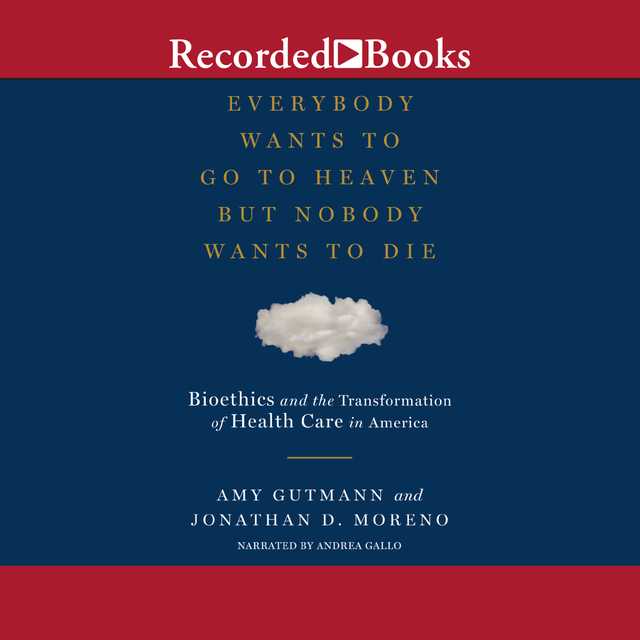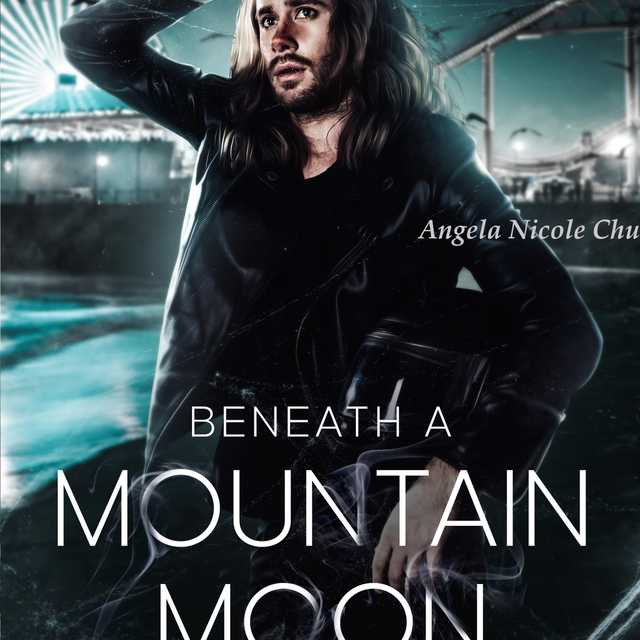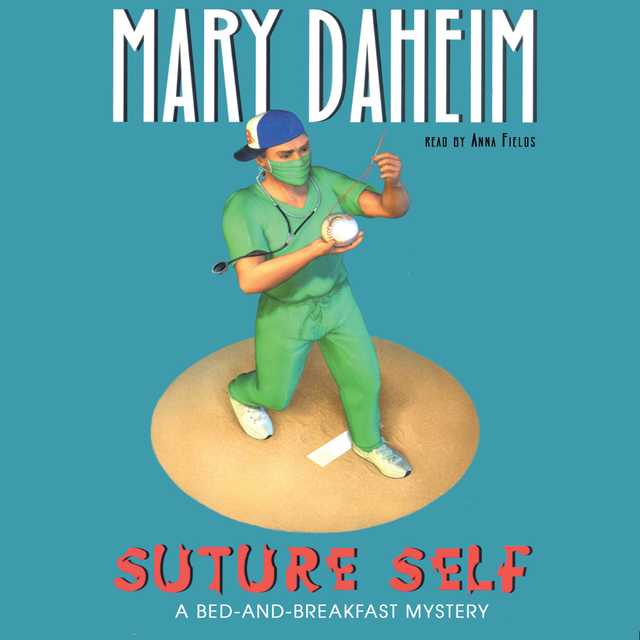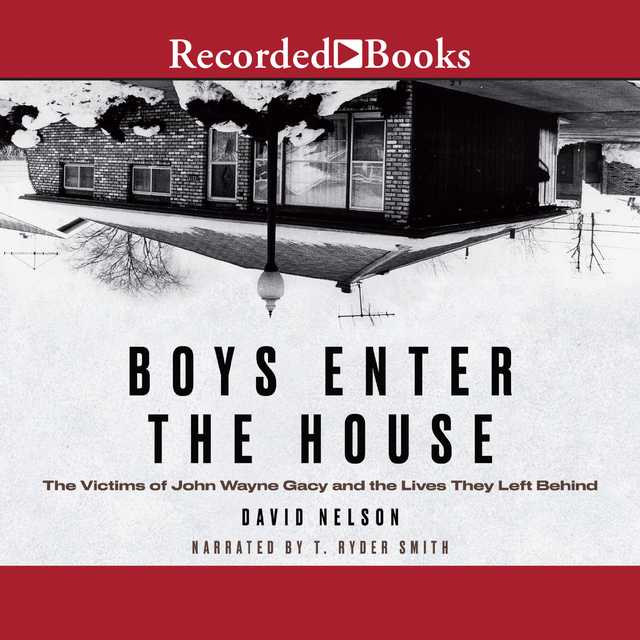Address Unknown Audiobook Summary
A rediscovered classic and international bestseller that recounts the gripping tale of a friendship destroyed at the hands of Nazi Germany
In this searing novel, Kathrine Kressmann Taylor brings vividly to life the insidious spread of Nazism through a series of letters between Max, a Jewish art dealer in San Francisco, and Martin, his friend and former business partner who has returned to Germany in 1932, just as Hitler is coming to power.
Originally published in Story magazine in 1938, Address Unknown became an international sensation. Credited with exposing the dangers of Nazism to American readers early on, it is also a scathing indictment of fascist movements around the world and a harrowing expose of the power of the pen as a weapon.
A powerful and eloquent tale about the consequences of a friendship–and society–poisoned by extremism, Address Unknown remains hauntingly and painfully relevant today.
Other Top Audiobooks
Address Unknown Audiobook Narrator
Rob Shapiro is the narrator of Address Unknown audiobook that was written by Kathrine Kressmann Taylor
Kathrinek Ressmannt Taylor was an American author best remembered for Address Unknown, originally published in Story magazine in 1938. She was also the author of Day of No Return, and a professor of creative writing and journalism at Gettysburg College in Pennsylvania for nineteen years. Kressmann Taylor died in Minnesota in 1996.
About the Author(s) of Address Unknown
Kathrine Kressmann Taylor is the author of Address Unknown
More From the Same
- Publisher : HarperAudio
- Abraham
- American Gods [TV Tie-In]
- Dead Ringer
- House of Sand and Fog
- Prey
Address Unknown Full Details
| Narrator | Rob Shapiro |
| Length | 1 hours 8 minutes |
| Author | Kathrine Kressmann Taylor |
| Category | |
| Publisher | HarperAudio |
| Release date | June 29, 2021 |
| ISBN | 9780063068513 |
Additional info
The publisher of the Address Unknown is HarperAudio. The imprint is HarperAudio. It is supplied by HarperAudio. The ISBN-13 is 9780063068513.
Global Availability
This book is only available in the United States.
Goodreads Reviews
Ilse
June 26, 2020
Reading this article in The Guardian last week, which praises Address unknown as an anti-Nazi-novel that saw into the future, I admit I am frightened that the author is right concluding that the novel’s prescience is not confined to its time and saw into our own future too. In hindsight, it is this chilling perspective which makes the novel even more worth reading at present. As originally published in 1938, this is a striking document as Kathrine Kressmann Taylor wrote on ordinary, liberal-minded and civilised people sliding into anti-Semitic barbarism even before the wave of violent pogroms which took place on November 9 and 10, 1938, known as Kristallnacht. According to her son’s foreword, the story is purportedly based on Kressmann’s bewilderment at the change of mind and heart of some American-German friends who had returned from Germany and since had disavowed former Jewish friends. As she worried about what she felt as the lack of awareness, care and insight in the US on the nature of Nazism, her journalistic instincts were triggered and her research on the regime resulted in this (fictional) account.Address unknown consists of the (fictional) correspondence between two Germans who run an art gallery in California and start to write letters when Martin Schulse in 1932 returns to Germany with his family while his Jewish friend and business partner Max Eisenstein stays in San Francisco. From the letters unfolds a powerful and finely written short story documenting the disintegration of their longstanding friendship by the slithering down from liberalism into opportunism, ideological blinding and cowardice, ending up in cruelty and bitter, cold-blooded revenge. The brevity of the format – we get to read 19 short letters stretching from November 1932 to March 1934 – tells not to expect so much as a subtle portrayal of the characters (Martin’s, who next to the other abject opinions he will ventilate once settled in Germany, earlier on displays a vision on women as baby machines, might come across as rather caricatural), but the brutal denouement is nonetheless poignant and gut-punching. Coincidentally this story turned out a timely tandem read with a recent thought-provoking essay De eerste boze burger by the Dutch writer Arnon Grunberg, a slightly philosophical pamphlet on migration and xenophobia which deals with certain psychological mechanisms at play – one of his central theses that the fear of the ‘newcomer’ in society parallels the anxiety of a jealous lover. He equals one’s love for one’s country with the pursuit of paradise, the pursuit of ‘the one’ not lover but place where one can live, which one can call home and call its own– so it belongs to one exclusively, like some people feel the need to consider their lover exclusively theirs – turning the newcomer into a threat and a rival and so spurring sentiments in the vein of one’s land, like one’s lover, shouldn’t be welcoming another lover, making one feel replaceable (according to Grunberg this fear of being replaced is a deeply embedded fear, referring to the chanting in Charlottesville in 2017 ‘Jews will not replace us’). Reading this essay written by an author having grown up in a family of Jewish immigrants, originally from Germany (his mother was a survivor of Auschwitz) for me made the reflections of Martin Schulse on the rise to power of Hitler and his views on the Jews which tune slowly to the regime’s only more haunting and frighteningly relevant nowadays.Although I am aware comparisons of current times and mores with the 1930s are not to be made heedlessly (and in the small region where I happen to live seem to have become almost taboo since the rise to power of the Nationalists), this cynic tale could function as a cautionary read for anyone inclined to minimalize or gloss over the weight of words as being merely words when confronted with deliberately provocative tough statements of populist political leaders for instance taunting the ‘Gutmenschen’ offering shelter to homeless refugees in winter or sneering about the victims’ own responsibility when a child of two accompanying her migrant parents has been killed by a police bullet (startling assertions chilling me to the bone). (Paintings by Sylvie Coupé Thouron)
Jaline
January 31, 2019
Words have power. We readers know that as we find ourselves moved to tears, beside ourselves with outrage, or smiling at the foibles of our fellow humans – and ourselves.Spoken words have power, too. Charismatic leaders and fanatic leaders know this, and know exactly how to put their words across to increase their own power. Generating and maintaining fear is one way to do it; taking credit for improvements that are actually the result of a previous leader’s efforts is common; and so is scapegoating.Scapegoating is probably the most insidious and destructive use of words ever. Take a problem that you know concerns the largest number of people, find a scapegoat group of people, and in speech after speech, in written words and spoken words, on film or any media available, and the weak and ignorant and fearful masses will follow this leader into the maw of hell.Does any of this sound familiar? It should. History tells us these are the tactics Adolf Hitler used to justify mass genocide – “intentional action to destroy a people in whole or in part” according to Wikipedia. Destroying people either physically and/or in their souls.This little book was published in the United States in 1938 and became a classic in the author’s own lifetime. Its popularity was instant and far-reaching for the time, yet it wasn’t until many decades later that it reached continental Europe. Since its initial publication it has surged into popularity again and again because of the truths it bears – and the warnings.World War II has been over for more than 70 years. When the war ended, everyone everywhere said, “Never again.” Did we mean it or are they just more words?
s.penkevich
February 05, 2022
Address Unknown by Katherine Kressmann Taylor is credited as being an early warning cry in the US about the rising tide of facism and the atrocities committed under Hitler. Published in Story Magazine in 1938 under the name Kressmann Taylor—as the short story was deemed ‘too strong to appear under the name of a woman’—this epistolary tale follows two German art dealers who had moved to the United States after the Great War. Max Einstein, a Jewish man, has stayed in the US while his long-time friend and business partner, Martin Schulse, has returned to Berlin coinciding with Hitler’s rise to power. As the two exchange letters, Max watches in horror as his friend succumbs to Nazi propaganda and ideology, fracturing their friendship irrevocably and leading to extreme ends. While it is a singular moment in history, the story resonates to the present day as a terrifying insight into the pull toward violent subservience to toxic nationalist supremacy that still infringes on basic human decency to this day and this tragic revenge plot short story is just as impactful now as it was in 1938.In the afterword written by the author’s son it is said that the story was inspired by an actual news story that occurred in the late 30s. America was hearing second-hand reports of the rising tide of fascism and much of it was filtered or dismissed by wealthy men sympathetic to Hitler like Charles Lindbergh and Henry Ford, the latter running his own anti-semetic newspaper, The Dearborn Independent. American student’s studying in Berlin wrote to the US warning them of the dangers of Hitler and Nazism, attempting to provide first-hand accounts that people would listen to despite cries of falsehood. Their fraternity brothers thought it would be funny to write them letters mocking Hitler, to which they received desperate responses urging them to stop. ’Stop it. We’re in danger. These people don’t fool around. You could murder [someone] by writing letters to him.’This brief story, abou 60 pages in print, follows from this notion. It begins with cordial exchanges full of brotherly love. Martin is quickly unsympathetic, as it is revealed he cheated on his wife with Max’s younger sister, but Max still seems to hold him in high regard and understanding. However, Max also harbors more overt misogyny with insistances to get married for the sake of having someone do all your chores and to keep them too busy having babies to ‘to fret about anything.’ Big shocker this prick suddenly begins to counter Max’s concerns about Hitler by praising the new leader. There is a painful desperation as Max pleads with his former friend to look at the lack of humanity in his new-found ideologies. Both men want good outcomes for Germany, but Martin sees the extermination of the Jews as fully acceptable for this purpose, going so far as to claim he loved Max ‘despite’ being Jewish. It is with extreme sadness and frustration someone suddenly realizes a friend or relative would view your own murder as justified simply for your identity, thinks your existance is worth less than their profits, or holds opinions that open opportunity for violence against people you love. Watching people you thought you knew fall prey to violent ideologies has been a tragic occurrence through human history and wherever you are in the world there is likely such a struggle happening. Recent mutations of this in the United States have happened with families torn apart by members ravaged by QAnon conspiracies, though so far there has not been much bloodshed as elsewhere (public book burnings are now happening though.)This happens the world over and this is happening to Max and his sister. After a dramatic and horrific sudden event, Max begins to extract revenge of Martin, who has said he can have no further friendly conversation with Max and all communication must be strictly business related. Cleverly, Max makes business letters and sends cables to Martin full of specific art piece dimensions, large stock numbers, oddly specific mentions of dates and weather that are understandably appearing to German mail censors as code. The end is bleakly satisfying but in a way that makes you shudder for the humanity of it all.Brief but infinitely impactful, Address Unknown is a minor masterpiece. The style is so slick and smooth, with a few visual aids to pull you into the theater of it all. Granted, the two voices aren’t very unique, but the power of the story and the impressions of atrocities it imposes upon you certainly gloss over any minor gripes. This is just as important today as when it was written, and the recent reprinting seems ominous. It is a reminder to take note of the warning signs and to take action before it is too late. Take care of yourselves and each other, friends.4.5/5
Mutasim
July 15, 2020
"A short time before the war, some cultivated, intellectual, warmhearted German friends of mine returned to Germany after living in the United States. In a very short time they turned into sworn Nazis. They refused to listen to the slightest criticism about Hitler. During a return visit to California, they met an old, dear friend of theirs on the street who had been very close to them and who was a Jew. They did not speak to him. They turned their backs on him when he held his hands out to embrace them. How can such a thing happen? I wondered. What changed their hearts so? What steps brought them to such cruelty? These questions haunted me very much and I could not forget them. It was hard to believe that these people whom I knew and respected had fallen victim to the Nazi poison. I began researching Hitler and reading his speeches and the writings of his advisors. What I discovered was terrifying. What worried me most was that no one in America was aware of what was happening in Germany and they also did not care. In 1938, the isolationist movement in America was strong; the politicians said that affairs in Europe were none of our business and that Germany was fine. Even Charles Lindbergh came back from Germany saying how wonderful the people were. But some students who had returned from studying in Germany told the truth about the Nazi atrocities. When their fraternity brothers thought it would be fun to send them letters making fun of Hitler, they wrote back and said, “Stop it. We’re in danger. These people don’t fool around. You could murder one of these Nazis by writing letters to him.”" That is how Kathrine Kressmann Taylor explained the inspiration behind Address Unknown, now regarded as one of the seminal works of anti-Nazi literature. Originally published in 1938, the short story is written in the form of an exchange of letters at the height of the rise of Nazism in Germany, between two business partners and friends. Martin is a gentile who has recently returned to Germany and becomes indoctrinated into Nazi ideology. Max is a Jew who stayed back in America to continue the business. "Does the surgeon spare the cancer because he must cut to remove it? We are cruel. Of course we are cruel." The story explores themes of bigotry and fascism and how the tables could be so easily turned on people who live by fear-mongering by vilifying others. The story uses the most amazing concept: using a letter as a weapon of vengeance. I believe this book is surprisingly relevant in this era of liberalism when fascist ideals are again on the rise and being easily circulated and accepted by the masses. It is unfortunate that over 80 years after its publication, the underlying premise still holds true and relevant.
Tim
May 16, 2021
Why do more people not talk about this book? Originally published in 1938, this story is series of fictional letters between a Jewish art dealer living in San Francisco and his former business partner, who has returned to Germany. Through these letters we see the Nazi's grow stronger, we see the way people were indoctrinated, and we see how insidious their power was. Apparently the book was written after the author was shocked at the changes she would see in how her American-German friends after they returned to Germany. How normal people caught up in the hatred and madness. I rarely use phrases like "this is a powerful work" because it seems like the go-to cliché phrase for saying it made you think or feel something, but in this case, it seems not only accurate, but the only way I can currently express my reaction. This is a powerful and at times quite shocking work.Again, I do not know why I had never heard of this before. It was apparently very well received upon publication, and it is an important work. Why this one is not regularly taught in Highschool English, I do not know. There is nothing more I can say and no more praise I can offer. A rare 5/5 stars.My thanks to Netgalley and Ecco for providing me a copy in exchange for an honest review.
Fran (apologies...way behind)
March 24, 2021
"Address Unknown" written in 1938, has remained timely for over 80 years. Written in epistolary form, consisting of nineteen letters and one cablegram written between the fall of 1932 and the spring of 1934 , the points of view of two friends, co-owners of an art gallery in San Francisco were revealed. Martin Schluse had decided to move back to Germany with his wife and three young sons. "You are right to go...you have never become American despite your success here...Take your sturdy German boys back to the homeland to be educated", so states Max.Martin described his thirty room house in Munich, a house purchased on the cheap. "How poor is now this sad land of mine...but...we employ now ten servants for the same wages of our two in the San Francisco home...Our American income places us among the wealthy here." Writing from the Schluse-Eisenstein Gallery, Max described taking delight in "meaningless little triumphs...gloating because I have tricked a giddy old woman into buying a monstrosity...You with your country house and your affluence...We are vain and we are dishonest persons...".It had been fourteen years since World War I, "the old despair has been thrown aside like a forgotten cart." Martin writes, "I think in many ways Hitler is good for Germany...strong as only a great orator and a zealot can be...a big movement...a feeling that we of Germany have found our destiny...Even now there are wrongs being done...these things pass; if the end in view is right...Is the end right?"Max is distressed at reports from the Fatherland...a terrible pogrom...it is almost unbelievable that the old martyrdom must be endured in a civilized nation. Martin's view is that "a few must suffer for millions to be saved...In defeat for fourteen years...we rise in our might...the rebirth of the new Germany under our Gentle Leader!"A long-standing friendship has unraveled. Once Martin moved to Germany, his liberal views morphed into action, his intention to put his "back and shoulders" behind the great new movement. He was a German patriot, now a member of the National Socialist Party. It was impossible to correspond with a Jew. Max's sister, an actress living in Europe, had been offered an acting job in Berlin. Although using a stage name, "her features, gestures and emotional voice proclaimed her [ethnicity]." Where is she now?"Address Unknown" by Kathrine Kressmann Taylor is an anti-Nazi work of fiction. The reader is privy to the conversation between two former friends. As Martin's ideological views emerged, he disavowed his friendship and correspondence with Max. The power of words...a cablegram sent to Martin...to a man [Max] had loved as a brother... This cautionary novel should become an essential student read.Thank you Ecco and Net Galley for the ARC in exchange for an honest review.
Karen
January 18, 2023
A very short novella.The Nazi regime and how it brought a friendship/ business partnership to an end when one of the two German American friends moves his familv hack to Germany. The one who stayed in America was of German/Jewish heritage.Totally written in a correspondence of letters.Powerful with a brilliant ending!This was written right when things were beginning to escalate under Hitler
Repellent
August 09, 2019
Brutal. Simplemente brutal. Defenderé siempre que hay que tener mucho talento para contar tanto y con tanta profundidad en relatos tan cortos. Paradero desconocido es un relatito epistolar que no llega ni a 70 páginas que no va a dejar indiferente a nadie. Y no voy a deciros nada de la trama porque hay que cogerlo sin saber absolutamente nada de él. Así lo cogí yo y me ha encantado. Dato interesante es que "Paradero desconocido" fue un libro prohibido en Europa durante mucho tiempo y que la autora como tantas mujeres escritoras, tuvo que ponerse un nombre aparentemente masculino por considerarse lo que escribía más propio de un escritor.
Jon
June 04, 2022
Follow the banality of evil through this exchange of letters...read between the lines and find one of the best horror stories ever; the most horrific aspect being that it probably happened to some people in a slightly different way. A stark reminder of how dictatorships utilize conformity as a means to an end.
Libros Prestados
December 06, 2020
Cuanta mala leche concentrada en tan pocas páginas. Cuanto presagio en una novela de 1938. Porque eso es lo que más me ha alucinado: que en 1938 ya había gente que sabía lo que estaba pasando, que lo denunció. Y nadie les hizo caso. Si esto ya lo suponía una estadounidense antes de la guerra, imagínate lo vacías que suenan las excusas de los alemanes que decían que no sabían nada.Es una novela epistolar muy corta, muy concisa, que expresa de maravilla la idea, y es tan cruel en su ejecución que hasta sonreí y todo al final. Una obra maestra.
Aqsa
May 01, 2019
Read for March Reading Sprint-2019 in Buddy Reads.Believe me, you do not want to miss this book. It’s just 40 pages long and just read it.“This modern story is perfection itself. It is the most effective indictment of Nazism to appear in fiction.”──The New York Times Book ReviewThis is written in the form of letters (which are easy to get into) between a Jew (Max) living in America and his best friend and partner (Martin) who has returned to Germany. You see how Nazi poison got hold of Martin and how it affected their friendship and his own idea of a Nation. I recommend reading the Afterword at the end.HIGHLY RECOMMENDED!RTCA powerful review from Jaline:https://www.goodreads.com/review/show... book_show_action=false&from_review_page=1 My Thoughts as I Read: November 12, 1932(view spoiler)[It was easy to get into because I just read another book written in the same way and with hints of WW2. I feel like this is something good. I’m dreading how this conversation would be like by the end. War is coming back. (hide spoiler)]December 10, 1932(view spoiler)[Um… Okay. It’s gripping, isn’t it? I really can’t find much to say other than read ahead. (hide spoiler)]January 21, 1933(view spoiler)[Oh Hitler. I’m loving this book. Waiting for a blow. (hide spoiler)]March 25, 1933(view spoiler)[Martin is right. I loved his questions. (hide spoiler)]May 18, 1933(view spoiler)[Holding m breath. (hide spoiler)]July 9, 1933(view spoiler)[Damn. I did not expect this. Gentle Leader? Seriously? God. It’s unnerving how Hitler corrupted the minds. (hide spoiler)]August 1, 1933(view spoiler)[I think he’s gonna be disappointed. Hitler hit at the right spot, but we cannot blame Hitler alone. (hide spoiler)]August 18, 1933(view spoiler)[I’m really mad right now. Human life comes first. (hide spoiler)]September 5, 1933(view spoiler)[Oh no. Damn. I don’t think he’ll reply. (hide spoiler)]November 5, 1933(view spoiler)[Could it be that Martin himself had her caught? Am I thinking too much? (hide spoiler)]November 23, 1933(view spoiler)[It’s amazing how quick the friendship died. (hide spoiler)]December 8, 1933(view spoiler)[Oh poor girl, she actually smiled? Oh, it hurts. It must have been dangerous for Martin but he just shut it on her face. (hide spoiler)]MUNICH JANUARY 2 1934(view spoiler)[Where did this one come from? Details of account in America? Who is Einstein? (hide spoiler)]January 3, 1934 and January 17, 1934(view spoiler)[Glad Max didn’t write again. Martin didn’t even try. (hide spoiler)]January 29, 1934(view spoiler)[What reunion? Just something stupid? (hide spoiler)]February 12, 1934(view spoiler)[Hmph, mercy? Did Max do it to have Martin caught? Really? (hide spoiler)]Afterword:(view spoiler)[Letters as weapon, wow. This was enlightening. I wanna read about Hitler and his power of persuasion now. (hide spoiler)]
PattyMacDotComma
October 30, 2021
5★“In 1939, Simon & Schuster brought out ‘Address Unknown’ as a book and sold fifty thousand copies — a huge number in those years. A quote from The New York Times Book Review stated: This modern story is perfection itself. It is the most effective indictment of Nazism to appear in fiction.” (From the foreword) At the end of 1938, this was first published in “Story”, a literary magazine, and the issue sold out in ten days. Today, we’d say it went viral. It’s easy to see why, and also why they took the opportunity to turn it into a small book.It’s November, 1932. Two men, Martin and Max, have been close friends and business partners for years, but Martin thinks it’s time to take his young sons back to Germany to grow up. They write to each other regularly, glad that The War (WWI) is behind them. Max is still running their art gallery in San Francisco and keeps Martin updated on the business and customers when he forwards him his share of the income.Martin writes that he and Elsa are treated like millionaires in war-ravaged Germany, and they’ve been able to buy a magnificent home on a large estate, so they are living it up, with servants, ponies for the children, and another baby on the way.This takes place as Hitler is coming to power, capturing the imagination of the Germans who were left so devastated after the Great War. “Elsa's family do not find things so easy now. The brothers are in the professions and, while much respected, must live together in one house. To the family we seem American millionaires and while we are far from that yet our American income places us among the wealthy here. The better foods are high in price and there is much political unrest. . . ”Their correspondence continues until March 1934. Another writer might have needed a novel, but this is why I love a good short story. It’s all here. The men, the personalities, the changing mood of the times. But I guess it was too good to pass up. It has been made into a radio play, a stage play, and a film, which I’m sure are equally moving, but this will do me just fine. Here’s a link to where you can download this and other stories.http://www.acobas.net/teaching/textbo...
Most Popular Audiobooks
Frequently asked questions
Listening to audiobooks not only easy, it is also very convenient. You can listen to audiobooks on almost every device. From your laptop to your smart phone or even a smart speaker like Apple HomePod or even Alexa. Here’s how you can get started listening to audiobooks.
- 1. Download your favorite audiobook app such as Speechify.
- 2. Sign up for an account.
- 3. Browse the library for the best audiobooks and select the first one for free
- 4. Download the audiobook file to your device
- 5. Open the Speechify audiobook app and select the audiobook you want to listen to.
- 6. Adjust the playback speed and other settings to your preference.
- 7. Press play and enjoy!
While you can listen to the bestsellers on almost any device, and preferences may vary, generally smart phones are offer the most convenience factor. You could be working out, grocery shopping, or even watching your dog in the dog park on a Saturday morning.
However, most audiobook apps work across multiple devices so you can pick up that riveting new Stephen King book you started at the dog park, back on your laptop when you get back home.
Speechify is one of the best apps for audiobooks. The pricing structure is the most competitive in the market and the app is easy to use. It features the best sellers and award winning authors. Listen to your favorite books or discover new ones and listen to real voice actors read to you. Getting started is easy, the first book is free.
Research showcasing the brain health benefits of reading on a regular basis is wide-ranging and undeniable. However, research comparing the benefits of reading vs listening is much more sparse. According to professor of psychology and author Dr. Kristen Willeumier, though, there is good reason to believe that the reading experience provided by audiobooks offers many of the same brain benefits as reading a physical book.
Audiobooks are recordings of books that are read aloud by a professional voice actor. The recordings are typically available for purchase and download in digital formats such as MP3, WMA, or AAC. They can also be streamed from online services like Speechify, Audible, AppleBooks, or Spotify.
You simply download the app onto your smart phone, create your account, and in Speechify, you can choose your first book, from our vast library of best-sellers and classics, to read for free.
Audiobooks, like real books can add up over time. Here’s where you can listen to audiobooks for free. Speechify let’s you read your first best seller for free. Apart from that, we have a vast selection of free audiobooks that you can enjoy. Get the same rich experience no matter if the book was free or not.
It depends. Yes, there are free audiobooks and paid audiobooks. Speechify offers a blend of both!
It varies. The easiest way depends on a few things. The app and service you use, which device, and platform. Speechify is the easiest way to listen to audiobooks. Downloading the app is quick. It is not a large app and does not eat up space on your iPhone or Android device.
Listening to audiobooks on your smart phone, with Speechify, is the easiest way to listen to audiobooks.

